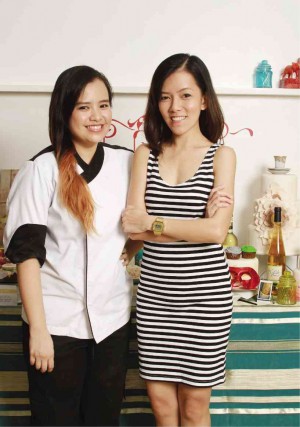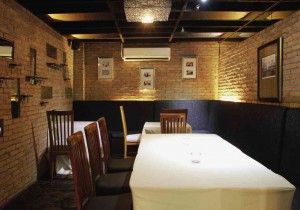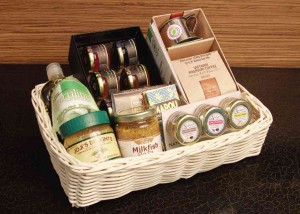How restaurants survive without depending on walk-ins
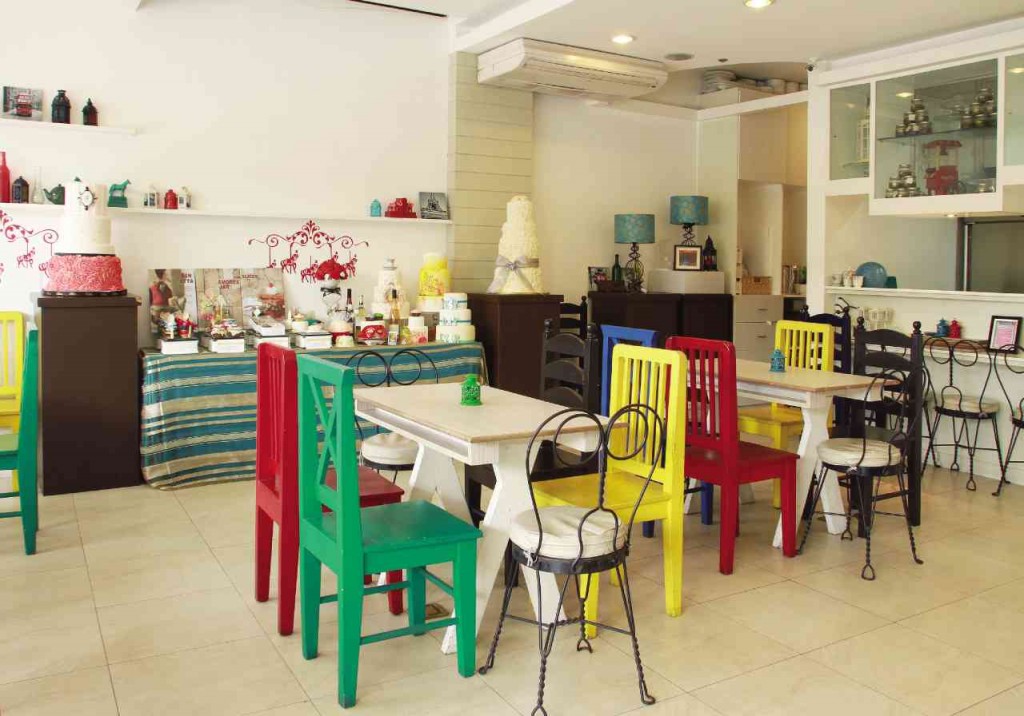
PAIRE and Cocktails restaurant at Cocoon Boutique hotel can double as a venue for theme events. NELSON MATAWARAN
Owning a restaurant is a dream of chefs and entrepreneurs. But the reality is that it takes hard work to attract the market and sustain operations with a high overhead. Here are some entrepreneurs who share their insights on how they use other businesses to keep their restaurant afloat.
Paire Cocktails and Pastries
This cute little restaurant was born out of the passions of two sisters. Kathlene Anne Nantes, a fine arts graduate, and her sister, Krystel Abby, a chef. Since their teens, they would organize creative theme parties for their families.
With the help of their parents and relatives, they put up a restaurant with a unique concept of offering cocktails paired with desserts. The restaurant is located at Cocoon Boutique Hotel in the quiet neighborhood of Scout Tobias and Scout Rallos streets.
The theme may seem arcane to that market in Quezon City. Nantes says the sisters must be creative in finding opportunities for business. They get more orders for special events.
The Nanteses are tapped for their appetizers, cocktails and desserts for company parties, weddings and debuts. They can also provide a complete package that includes a light meal.
Paire Cocktails and Pastries is gaining a reputation for its beautiful cakes. They prepare fun cakes, customized for the celebrator or recipient. A seven-year-old client, for example, asked for Princess Elsa of “Frozen” as the piece de resistance. Their biggest challenge was to make an edible fondant bust of child star, Ryzza Mae Dizon, for her televised birthday celebration. The life-size cake was ordered by Bioflu, of which she is an endorser.
The sisters have also been a supplier for giveaways and edible table decors. Tiny cakes or smores are packaged beautifully in little jars.
Nantes adds that their restaurant also delivers desserts to small cafés, salons and shops.
To create activities in the shop, Paire Cocktails and Pastries organized workshops in various themes. A bridal workshop included lectures from wedding professionals on preparations, snacks and gift checks from their partners. “Spice Up Your Space” catered to people who wanted to unleash their inner interior designer. The workshop included a lecture on space by an architect and a DIY (do it yourself) activity of making bookends. A career orientation seminar for hotel and restaurant students held demonstrations on cake fondant designs, cocktails and pastries.
On special occasions, the restaurant will organize a degustacion that includes a beautiful table setting and a five-course meal prepared ala minute for a reasonable P1,500.
For its whimsical décor, Paire Cocktails and Pastries has also been booked as a venue for intimate events, debuts and wedding reception.
Nantes says that since the restaurant opened in December 2011, customized cakes comprise 50 percent of their sales followed by catering for special events, which is 25 percent. Its market consists of women under 40, who work in Makati and Ortigas business centers.
She credits social media for creating awareness for their business. “When we post a new cake, it goes viral. It creates a recall and we get orders,” says Nantes.
Since 2013, the sisters were able to break-even after a lot of work. “We need to be innovative to survive. What drives us to continue is our passion,” she says.
Black Kitchen
This restaurant beside Paire Cocktails and Pastries at Cocoon Boutique Hotel not only differentiates itself for Philippine cuisine cooked European style and vice versa. It’s actually a food-tasting venue for potential clients.
After studying at the Culinary Institute of America in California, Chef Velmor de Roña ventured into catering.
He set up his first restaurant, Cucina ni Chef, in the prewar building of Casa Tesoro. Despite its success, the restaurant business closed down due to sanitation issues.
De Roña established Purpledish Catering, specializing in European-style cuisine for high-end clients. “If you mix blue for the cold dishes and red for the hot dishes, you get purple,” he explains.
He got his big break with General Electric (GE) as a corporate account for six months, by providing breakfast, lunch and snack for 300 people. De Roña recounts that when he signed his contract, GE representatives inspected his kitchen for its cleanliness. He first built his commissary in his house in Alabang and later moved it to a warehouse in Makati.
He attributes the success to word-of-mouth and social media. Couples gearing for their wedding would post the preparations in their blogs. “Miss Adventures with the Missus” wrote about the couple’s quest for the perfect caterer. After trying out 16 caterers, de Roña was the Holy Grail. The slow roast US beef won the couple over.
Out of an average of 200 inquiries a month, Purpledish gets some 80 to 90 bookings. The company has bookings until 2016. With rates of P1,090 to P2,510 per head, it has been de Roña’s main source of income
To attract the middle-income market, he formed Bluplates which offers American-style cuisine. The starting price is P790 per head.
Trained as an architect and a licensed interior designer, de Roña set up Stylento which handles styling for the events. Meanwhile, his Tinapay Express prepares the breads for these events.
“You’ve got to maximize your resources,” he says.
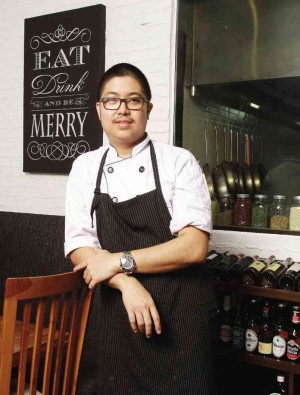
DESIGNER-turned-chef de Roña maximizes resources by putting up several businesses to support his food business.
The chef set up other businesses to widen his market. Metro Chef caters to corporate accounts and canteen concessionaires for One World HP and Ingram Micro. De Roña observes that only 70 percent of the employees avail of the canteen services and half of that eat dinner and lunch.
He says the challenge is to produce quality meals at a certain price range. The advantage of being a concessionaire is that he has a captured market of close to 4,000 and that the company subsidizes rent, electricity and water.
“It’s like having your own restaurant, but you pay only for the food and labor. Other restaurants target the corporate clients through food deliveries,” he says.
He established Black Kitchen in Cocoon hotel as a showcase for his catering services. Prospective clients can view the suggested table set-ups and try out the menu.
Still, walk-in guests can enjoy the chef’s innovation such as the best seller, the osso buco kare-kare. It combines veal shanks with traditional Filipino flavor. The Cirkulo Tofu is another winner. The molded tofu is filled with wine-cooked sisig and tokwa’t baboy sauce.
“There are many good chefs but their restaurants don’t survive because of the rent. Even if you get a lot of guests, it doesn’t add up to the overhead expenses, ” observes de Roña.
“With catering, the clients pay you before the event. In restaurants, you have to wait for the customer to dine in.”
Sugarleaf Organic Market and Café
The business started out as an advocacy. Entrepreneur Angelo Songco and his relatives served Kapampangan food at the Health Cube Building on Wilson Street, Greenhills. Meanwhile, a friend was subleasing a part of their space for organic produce from the Mt. Province. The business was prospering despite their high prices.
When the restaurant business folded up, Songco decided to support the organic produce and reinvent the business into Sugarleaf which was a combination of a mini-mart for healthy products and a modest restaurant which highlighted the fresh vegetables and fruits from the store.
Eventually, the owners of the Medicard Lifestyle Center on Paseo de Roxas, Makati, invited Sugarleaf to be a tenant. Songco observes that the Greenhills branch does better in the mini-mart while the Makati branch is busy during the lunch hour. The attraction is the choice of ingredients-certified organic produce, grass-fed beef, and free range-chicken.
“We are giving health to our customers and help organic farmers as well. These farmers pay for their certification. The Organic Certification Center of the Philippines has to check the soil and the surroundings of the farm to ensure that the produce is free from pollutants.”
The restaurant is famous for its sandwiches. From the online individual deliveries, they get a lot of bulk orders for pot luck parties.
“Instead of barbecue and pancit, they can have healthy wraps like our salable crabstick and mango wrap,” he says. The price ranges from P770 to P1,800 for 20 persons.
It recently launched a detox juicing program in which the ingredients are organic and the preparation is based on naturopathy principles.
To attract people to the restaurant, Sugarleaf organizes workshops and lectures at the Medicard building. He cites the raw food preparation as the most profitable with 30 paying guests and 15 media participants. Sugarleaf can also be used as a venue for meetings and intimate gatherings. Its biggest advantages are accessibility and the free basement parking.
Because of its reputation for selling high-quality foods, Sugarleaf sells organic produce to Green Pastures restaurant.
Still, much of the business is derived from the retail. The grocery offers sea salts from Pangasinan, dried mango with no sulphites, and breads with no conditioners, Daily Apple herbal teas, muesli, quinoa, and products from ChocoVron Global Corporation and Aloe Cure from organic basket, malunggay-based snacks from Nature Earth Corporation. They work with partner merchants on consignment.
Songco adds that gift sets are popular. Sugarleaf can make a present for as low as P70 such as sea salt and coco sugar, caught in a bow to a P3,000 basket with muesli, nuts, Vietnamese alkaline coffee, etc.
“We can prepare a customized gift pack for their needs such as products for diabetics or people trying to lose weight. Top-level executives usually baskets of ham and wine, we can make something for them which is a gift for good health.”
Juicers by Matstone, Breville and Vitamix are also doing brisk business.
Songco attributes his success from his previous work experience in hotels. “Learn discipline before taking risks.”

